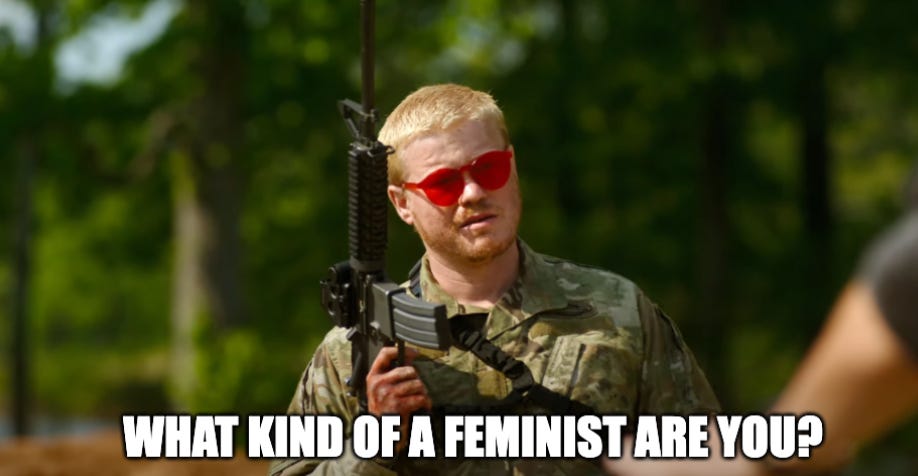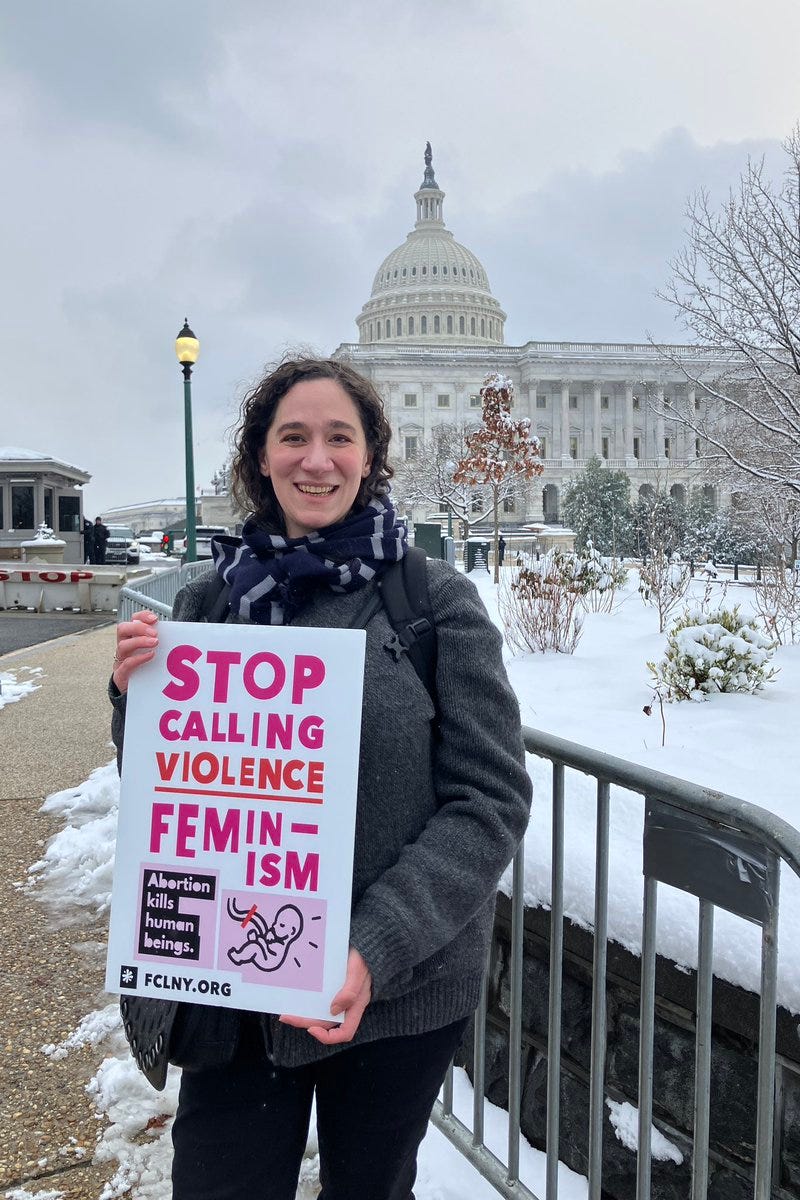So, What Kind of a Feminist Are You?
An invitation/warning to new readers ;)
Welcome to the more than 300+ new subscribers in the wake of the NYT “Did Women Ruin the Workplace” debate!
I spent more time there rebutting Helen Andrews, so I’d like to lay out a little of my positive vision for folks new to the substack. Let me say at the outset, the most valuable thing to me ever since I started Other Feminisms five years ago has been the diversity and thoughtfulness of the comment section. I put the ‘s’ at the end of Feminisms advisedly—you don’t need to totally agree with me to be part of this community.
Also, right now Notre Dame Press is having their winter sale, where all books are 50% off. So if you’d like to get The Dignity of Dependence half price, order here with code 14GIVEBKS.
I’ve summarized my book, The Dignity of Dependence: A Feminist Manifesto as sitting at the intersection of two controversial claims:
Women’s equality with men is not premised on our interchangeability with men.
Dependence on others is not a temporary embarrassment at the beginning (and end) (and much of the middle) of our lives but the pattern for how we live together.
In introducing my book (and myself!) to new readers, I’d also like to point to two thinkers who are forerunners of my ideas (though one would disavow where I’ve extended her ideas).
Acknowledging an asymmetry between men and women is dangerous-feeling, and with good reason! As the “Great Feminization” debate shows, if, in any way, you allow the claim that women and men are not basically identical, there will be plenty of people ready to argue this makes women lesser.
This is where I love the work of Caroline Criado Perez, the author of Invisible Women. She catalogues the ways that the built world is calibrated to a “male” normal. This isn’t something you can solve by simply working harder (doing it backwards in high heels).
There are plenty of genres of advice to women (Lean In, as a paradigmatic example) where women are advised on how to fit within male norms. But when medicine dosage is calibrated to male weights and hormones, no amount of power poses will get you the right treatment.
One of Criado Perez’s most shocking examples is the way that airbags are calibrated for the average space between the wheel and a male driver. Women, with shorter legs, sit closer to reach the brakes. In moderate accidents, we sustain serious injuries from airbags still exploding outward when they hit us, trying to reach the imaginary male a few inches further back.
Criado Perez found an extraordinary quote by Richard Schram, the Euro New Car Assessment Program’s technical director, justifying this disparate impact on women:
Biologically, females are slightly weaker, and women sitting closer to the steering wheel can be an issue. There is a difference between men and women; I acknowledge that, and I acknowledge this may be hard for women to accept… This is not an easy problem to solve. You could say the same thing about the elderly, because they are not average, either. The aging population is also more vulnerable than average drivers, due to weaker bones, and muscle mass and tone.
Here’s how I extend the analysis in The Dignity of Dependence:
For Schram, women and elderly people fall out of the category of the obviously human. They are technically human, of course, but not the kind of person you expect to meet or whom it is reasonable to plan to accommodate. Women can’t be safely accommodated in cars, Schram and the NHTSA say, because we are too vulnerable and too close. If we can’t harden our bones, and distance ourselves, why should someone else step in when we won’t make that minimum effort?
So far, Criado Perez and I (and pretty much all of you new readers, I suspect) are in agreement. Here’s the paragraph that follows in The Dignity of Dependence.
When ordinary parts of human life are written off as “the extreme ends,” everyone’s claim on their humanity becomes tenuous. Schram finds the frailty of the old disqualifying. They lived an ordinary human life for a time, but as their bones become brittle they begin to fade out of the category of persons. At the beginning of life, the same dismissal is made. As Fr. Richard John Neuhaus wrote, of the baby in the womb, “It has always struck me as puzzling that some people say that an embryo or a fetus does not look like a human being. That is exactly what a human being looks like when it is two weeks or two months old. It is what you looked like and what I looked like.”
A woman’s body isn’t always recognized as a fully human body when it doesn’t seem to be interchangeable enough with a man’s. Small wonder, then, that a baby can easily slip out of the category of human. If women are sometimes treated as an afterthought, a baby is a jarring aberration. More than that, the baby’s divergence from the autonomous ideal points back at its mother, exposing her own deeply human ways of being marked by dependence. A baby, or even the potential of a baby, strikes at both the aspiration to autonomy and the illusion of interchangeability between the sexes.
Here’s where some of you may choose to unsubscribe. Growing up, I thought of anti-abortion advocacy as directly harmful to women. I grew up as a fairly run of the mill, pro-choice feminist in a secular family on Long Island. I was an intermittent Planned Parenthood donor. I read The Cider House Rules and wondered if I had a moral obligation to become a doctor who was willing to perform abortions (but I also left the room when my mom watched ER).
Since then I’ve changed both more and less than I would have expected if you told college-aged me I’d become pro-life.
Changing my mind on abortion wasn’t the same thing as rejecting feminism. I have thought for a long time (on both sides of the issue) that this is the highest stakes disagreement where both sides are mostly in good faith. It’s hard to compromise, because there’s no fair middle. If babies aren’t people during pregnancy, it’s obscene to restrict women’s choice. If they are. it’s unjust to allow them to be killed.
One book that meant a lot to me, as I wrestled with these ideas, was historian Daniel K. Williams’s Defenders of the Unborn: The Pro-Life Movement Before Roe v. Wade. When I read it, I recognized people like my parents, who met at an anti-nukes advocacy meeting, who (almost) always rushed to protect vulnerable people and to speak up for those who couldn’t speak for themselves.
Williams’s book made me feel like I had a secret inheritance, and that many of the good faith, pro-choice feminists I’d grown up with had been stripped of something that was rightfully theirs: the freedom to advocate for women and children together.
You don’t have to agree with me to be part of the conversation here, but I’d welcome you introducing yourself.




I think this is a laudable invitation to new readers - I admire your courage of convictions and that you don't play hide the ball with your audience.
Just want to make a plug for new readers to stick around! The water's great, the content here is consistently interesting, and while Leah pulls zero punches, the vibe here is welcoming and tolerant of a lot of different viewpoints.
Even if your conception of self includes "I'm definitely not the kind of person who would read pro-life content", purely as a thought experiment, stick around for a few months and see how a slight modification to your media diet updates your beliefs - if at all!
Hi! I'm one of the new people who found you after the Douthat/Andrews podcast. I've long been the kind of feminist who basically believed we are petite men who can get pregnant, but of course the ability to get pregnant is in fact an enormous difference with many long lasting consequences. I work in a male-dominated field, and in some aspects it's a good fit for me, but in other areas I have to do a lot of contortion to meet the unspoken expectations.
Lately I've been questioning my view of feminism for various reasons, but I am, quite reasonably I think, put off by people saying that women are uniquely bad at existing in the world of economic productivity. I do think that is what Helen was saying (herself exempted of course), and you pushed back admirably and with great composure. I found myself unexpectedly agreeing with several things you said. I found your perspective that women are more noticeably entangled in webs of dependence to be an insightful statement, especially because it's true that men are also not autonomous islands, but women are the ones directly confronted with that reality for a large portion of our lives.
Ross introduced you as a conservative, and you commented on your pro-life principles during the interview, so it's not like that comes as a surprise. Also Ross himself is a conservative pro-life Catholic, so presumably those frightened off by his views wouldn't be listening to the podcast in the first place!
I agree with you that both sides of the abortion debate are in good faith. Unfortunately, there doesn't seem to be any way to resolve the fundamental disagreement objectively. Many seem to think they are advancing an objective truth, but their lack of curiosity and respect for others makes it impossible to genuinely engage with them. I like discussing areas of disagreement, but it's hard to find discussion partners who can disagree respectfully. I think I see respect here. My views are mostly not dogmatic on either side, FWIW. I sense a moral problem with abortion but I can't prove it objectively, and that makes it difficult for me to advocate any particular policy. I do think the mother's personhood is undeniable, so I am against policies that unnecessarily risk mothers' lives.
All that to say, I am looking specifically for fresh perspectives on feminism, its philosophy, and its goals. I think the overwhelming focus on abortion, as well as allowing other "intersectional" interests to take precedence over and above women's concerns, have both been bad for feminism. I hope to find a new and different path forward.